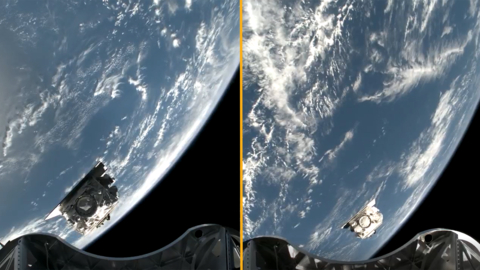Maxar Intelligence, provider of secure, precise geospatial intelligence, today confirmed the first two WorldView Legion satellites are performing well after being launched on a SpaceX Falcon 9 rocket earlier today from Vandenberg Space Force Base, California.
Shortly after launch, the satellites deployed their solar arrays and began receiving and sending signals. These satellites will undergo commissioning, and Maxar Intelligence expects first images from the spacecraft later this spring.
These two satellites are part of a first block of six WorldView Legion satellites. When these six satellites join Maxar Intelligence’s constellation, the business will be able to collect imagery of the most rapidly changing areas on Earth as frequently as every 20 to 30 minutes.
“The successful launch of the first two WorldView Legion satellites represents a transformational moment for our business,” said Maxar Intelligence CEO Dan Smoot. “These first-of-a-kind satellites will extend the quality and capability of our industry-leading constellation, tripling our ability to collect 30 cm-class imagery with high revisit rates and at more varied times throughout the day—meaning faster, more actionable insights for our customers. Thank you to all team members across Maxar who have worked tirelessly on this program to get us to this moment.”
Built by Maxar Space Systems, the two Earth observation satellites are the first Maxar 500TM series high-stability platforms to reach space. WorldView Legion spacecraft are a new approach to Earth imaging satellites. Its optical instrument, provided by Raytheon, delivers the same 30 cm-class imagery that Maxar is known for and benefits from the high stability and pointing accuracy of the Maxar 500 series bus.
“We are proud to partner with Maxar Intelligence on the WorldView Legion program,” said Maxar Space Systems CEO Chris Johnson. “We are happy to report the first two satellites launched and are performing nominally, and we remain focused on preparing to launch the additional four satellites later this year.”

